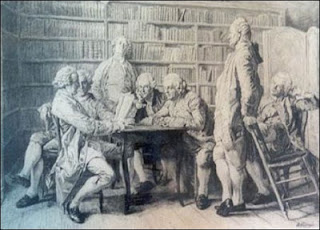The charm of Ben Franklin’s autobiography is its informal, first-draft feel. It reads like a letter to a friend. In fact, he starts it, “Dear son,” with a similar purpose as Solomon’s Proverbs: to impart knowledge and wisdom. But the challenge of this book is the linguistic style, which can be tricky for modern readers, especially for those unaccustomed to non-contemporary English. Even I had to backtrack a few times for understanding.
 |
| William Franklin, Benjamin's son |
In content, the autobiography is a de-uglified miniature of Isaacson’s epic. It addresses several of the same incidents, but it reads more like a series of anecdotes. There’s precious little backstory, and unsurprisingly, Franklin omits most of the unflattering stuff. Still, in his discussions on virtue, industry, and religion, he’s frank about his shortcomings. He emphasises his lessons learned, and as intended, palatably and powerfully delivers a bit of timeless wisdom.
I liked the first half of the book the best, when Franklin describes his time as an apprentice and printer, including his business relationships and professional strategies of varying success. He also touches on the Junto, his philosophical club. I would have given a big toe for a spot in that group, but alas, there were no members of the female inclination. I’d like to talk to Franklin about that gaping omission.
As Franklin transitions into his political career, the content interests me less, but several interpersonal accounts are entertaining enough, especially when he takes a tattling “I’m surrounded by idiots!” tone. Unfortunately, he writes nothing about his familial squabbles (and there were plenty) or his girlfriends (and there were plenty). Probably he found these things too personal or unflattering, or maybe he thought them less important than his career path. Or, perhaps, since Franklin was famously committed to delivering useful inventions, he considered those aspects of his life useless to his purpose of imparting wisdom, although if that were the case, I would disagree.
 |
| A meeting of the Junto |
The Autobiography of Benjamin Franklin is much shorter and less inclusive than Isaacson’s biography. If you’re as wildly in love with Ben as I am, read it as a companion to the biography to get a broader understanding of his wit, his writing style, his learning and teaching mechanisms, and his thought patterns. If you’re less passionate about the man and just want the general gist of Franklin without committing to 500 pages of Isaacson, then this sweet little volume should suffice.
